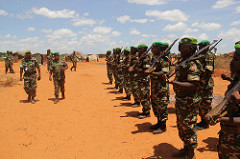AU asks Kenya, Uganda and Ethiopia to honour aircraft pledges

The African Union on its 608th meeting asked Kenya, Uganda and Ethiopia to honour their pledged air assets and deployment of additional force enablers.
Through a statement by the Peace and Security Council seen by the Star on Wednesday, the AU said prolonged negotiations between the UN and the Troop and Police Contributing Countries (T/PCCs) should be finalised to facilitate the deployment of these air assets.
Accordingly, the council reiterated its call for the urgent finalisation of the negotiations on the LOAs, without further delay, taking into account that “reimbursement rates for these assets should be commensurate with the context of Amisom asymmetrical operations”.
During the PSC’s 595th meeting held in Addis Ababa, on April 28, the council had raised a red flag over the delay in delivery of the assets especially at the current critical period for the mission and upcoming elections in Somalia.
In February, Kenya, Uganda and Ethiopia offered to supply helicopters for troops fighting under the Amisom in the fight against al Shabaab.
Troop-contributing countries to the AU’s mission in Somalia were required to deploy their own equipment, while a lack of air support has been highlighted as one of the mission’s major weaknesses in recent years in the operation.
Reports earlier suggested nine utility helicopters would be supplied between Kenya and Ethiopia, in addition to three attack helicopters.
The choppers would be the first major contribution to the Amisom’s airforce since Uganda pulled out of supplying four helicopters in 2012, after three of them crashed in Mt Kenya.
The PSCU also expressed concern about the recent decision by the European Union to alter payment procedures for the Burundian National Defence Force contingent within Amisom, bearing in mind the critical phase of the operations especially in light of the upcoming elections in Somalia.
The European Union recently reduced the budget to the mission by 20 per cent because of financial constraints and “competing priorities in Africa and the world in general”.
Consequently, PSCU urged the EU to “reverse or at least delay the implementation of this decision in order to avoid possible adverse effects that could undermine the mission’s operational momentum”.